10 Questions for Actor James McAvoy | reviews, news & interviews
10 Questions for Actor James McAvoy
10 Questions for Actor James McAvoy
The Scottish actor on playing the Scottish king in the West End
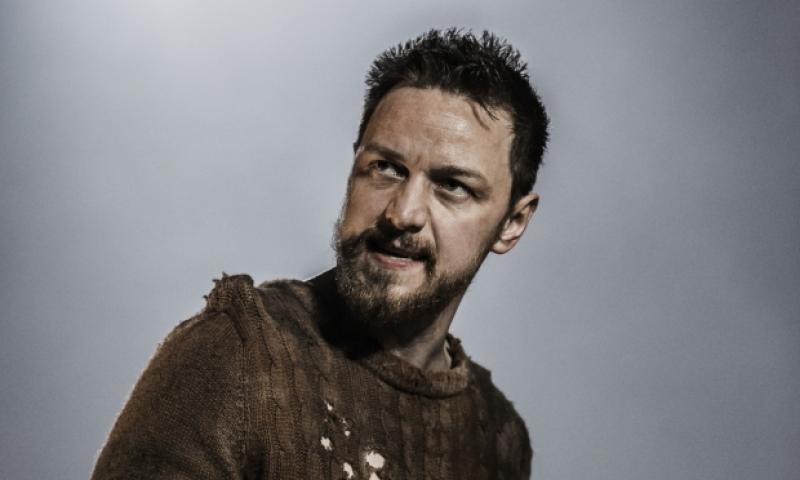
There has always been a keen air of propulsion to the career of James McAvoy. He made his name on television in State of Play and Shameless, while early film roles in Starter for 10 and Inside I’m Dancing swiftly promoted him up the leading man’s ladder to appear in The Last King of Scotland, Atonement, The Last Station, X-Men: First Class and, as of this month, Welcome to the Punch.
Equally comfortable playing romantic leads and action heroes, he has never been quite a force in theatre. This is partly a matter of choice. He has prioritised screen roles over stage opportunities. The last time he acted on stage was in 2009 in a popular West End production of Richard Greenberg’s three-hander Three Days of Rain. In the mean time he has been taking a while to shake off the halo of urgent youth. He has tended to play callow characters more sinned against than sinning – the closest he’s come to anything like villainy is as Idi Amin’s morally compromised medic.
But that’s all over now. At the Trafalgar Studios, McAvoy is starring in Macbeth, and turning in a hypnotic performance mixing panther-like physical litheness and rat-like cunning. It is no overstatement to say that his king of Scotland is a revelation - the reviews have certainly said as much. The first Scottish actor to play Macbeth in London in many years talks to theartsdesk.
JASPER REES: Is that your beard or Macbeth’s?
JAMES MCAVOY: This is a touch of both. I just usually don't shave until I get a job and they make me. When you meet Macbeth he’s been away from home for quite a while and I don’t think he’s had access to a shaving kit. It’s not a world in which it is easy to shave.
You visited the role before as Joe Macbeth in the BBC’s series Shakespeare ReTold updating six plays to the present day (pictured below McAvoy with Keeley Hawes). Did that give rise to the desire to do the play for real one day?
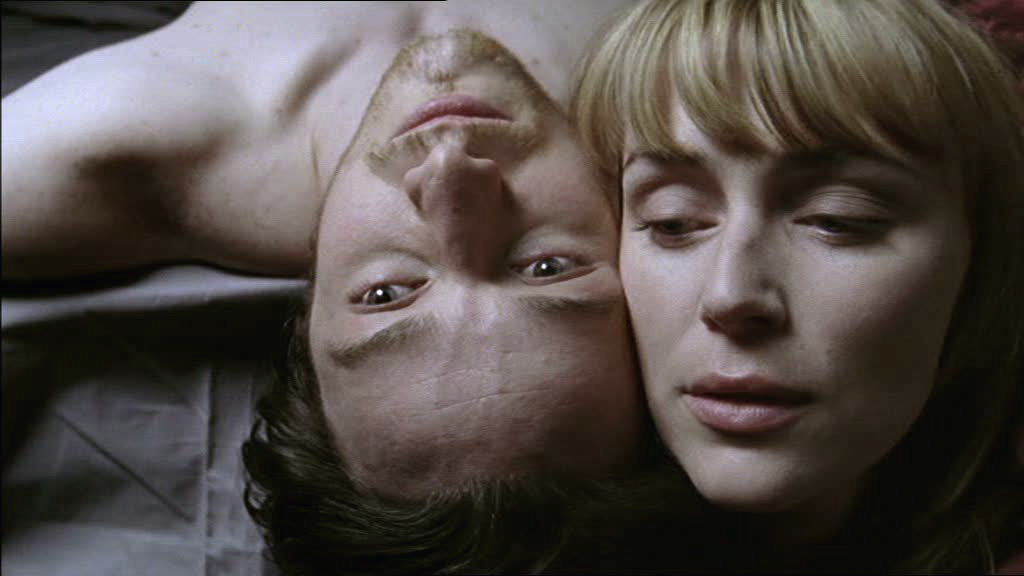 Dynamically it was inspired by Macbeth and dialogue wise it was inspired by the text of Macbeth. It was very different. But the situation that the Macbeth archetype found himself was pretty much exactly the same one. It was a fantastic experience. I was very young. I think I was about 25 or 24. And that made me think, obviously this isn’t Shakespeare’s text but I think it’s quite interesting having a young Macbeth because what you get is him and Lady Macbeth perceived to be throwing away their future all through ambition. And it makes their loss all the sadder, when he delivers the "Tomorrow and tomorrow and tomorrow" speech, which is an expression of utter blackness and fatalism and almost bordering on nihilism. To have that in one so young is so upsetting. So it opened up the idea of maybe doing the proper text young as well. A lot of the play is to do with just four lines, which begin “I have given suck...” And what’s brilliant is that these two 30somethings in our production are going through something that is very very rife right now, with people trying to have kids and not being able to in their thirties. And that’s something that is just interesting to play younger. It’s not a couple looking back and saying, “Right, we weren’t able to do that, what do we get? What’s our bit? What’s our piece?" It’s a couple who are still going through the grief of it. And I think they feel like the world owes them something.
Dynamically it was inspired by Macbeth and dialogue wise it was inspired by the text of Macbeth. It was very different. But the situation that the Macbeth archetype found himself was pretty much exactly the same one. It was a fantastic experience. I was very young. I think I was about 25 or 24. And that made me think, obviously this isn’t Shakespeare’s text but I think it’s quite interesting having a young Macbeth because what you get is him and Lady Macbeth perceived to be throwing away their future all through ambition. And it makes their loss all the sadder, when he delivers the "Tomorrow and tomorrow and tomorrow" speech, which is an expression of utter blackness and fatalism and almost bordering on nihilism. To have that in one so young is so upsetting. So it opened up the idea of maybe doing the proper text young as well. A lot of the play is to do with just four lines, which begin “I have given suck...” And what’s brilliant is that these two 30somethings in our production are going through something that is very very rife right now, with people trying to have kids and not being able to in their thirties. And that’s something that is just interesting to play younger. It’s not a couple looking back and saying, “Right, we weren’t able to do that, what do we get? What’s our bit? What’s our piece?" It’s a couple who are still going through the grief of it. And I think they feel like the world owes them something.
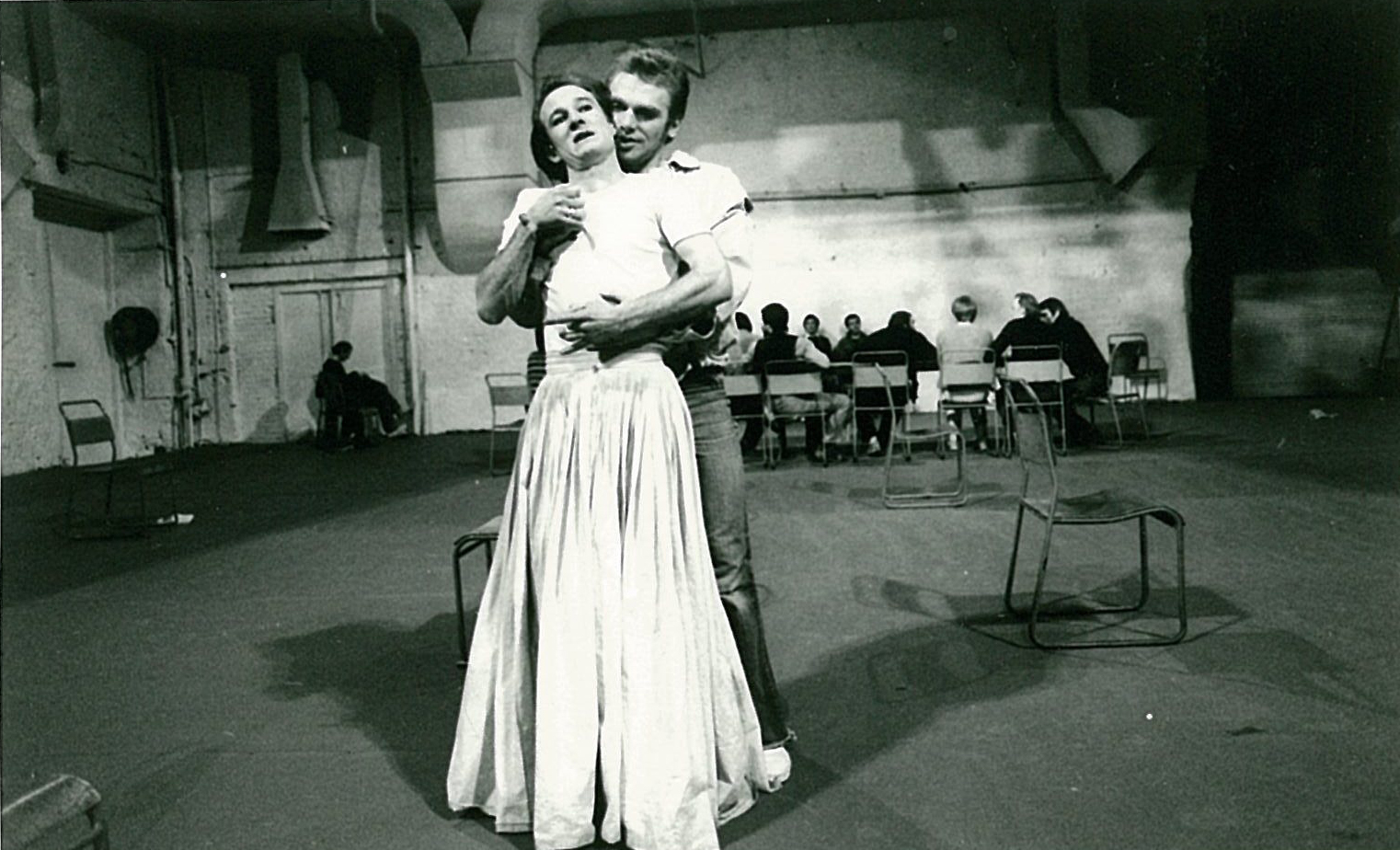 When did you first become aware of the play’s existence?
When did you first become aware of the play’s existence?
I was 14 or 15 and I was in my English class. We were reading Macbeth out loud. I think this keyed into why I became an actor really. I never really realised this. Our very lovely teacher lived next door to an actor, director and philanthropist called David Hayman, and he had famously played Lady Macbeth during the glory days of the Citizens Theatre during the Seventies (pictured above, Hayman as Lady Macbeth with Gerard Murphy). She said, "Why don’t you come in and give my class a talk on Macbeth and acting in Shakespeare in general?" So he came in, give us a bit of chat and that was the first time I really became aware of Macbeth as well as the idea of acting as something that somebody might be able to do one day. The first time Macbeth really came into my consciousness as something I would like to do is when I was standing in George Square in Glasgow and thinking I would love to do a massive open-air production of Macbeth and use the entire square and have the witches upon in the roofs of the building and just being a 20-year-old drama student letting my mind go mental. But the first time I thought about playing Macbeth was when I was about 24, 25 doing that telly one.
How about seeing the play?
The first time I saw Macbeth it was at the Brunton Theatre in Musselburgh, which is just outside Leith. And I remember thinking it was quite a fast-paced production and thinking, oh my goodness, this the first Shakespeare production I’ve seen that didn’t take three hours. I thought they must have cut down the text, they must have bastardised it, they must have really fucked with it. Nothing wrong with that. I was thinking, they must have really ripped it to pieces and put it back together again and then I read it again and thought, no they haven’t, Shakespeare just sort of wrote a psychological thriller one day. And it’s really fast and over quickly. You can stretch it out to three hours if you want but there’s no need. I just remember thinking that was fucking thrilling. It was an amazing production. That was the first time I saw a live production. And I was quite old at the time. I was 18 or something like that. I’ve seen lots of other interpretations since. But from the age of 25 I’ve known I’ve wanted to do it so I’ve kind of stopped watching other people do it because I don’t want to be bound into not doing something because I’m worried that somebody else made a similar choice.
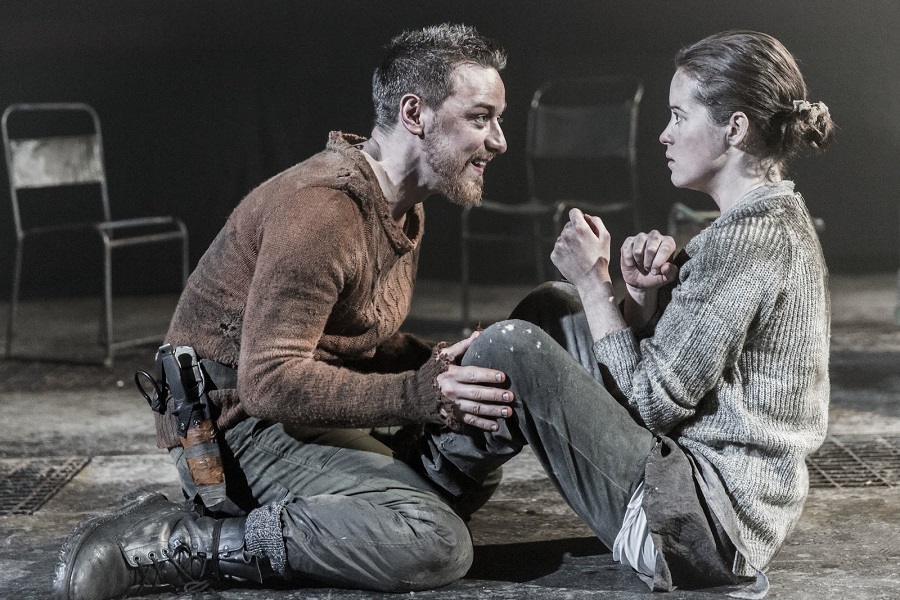 Have you been actively seeking opportunities? How did production come about? (Pictured above, McAvoy with Claire Foy as Lady Macbeth.)
Have you been actively seeking opportunities? How did production come about? (Pictured above, McAvoy with Claire Foy as Lady Macbeth.)
Jamie [Lloyd, the director] and I talked about doing this as we were enjoying a drink at the press night party of Three Days of Rain. And we were looking to do it fairly soon, within a year or two, and as things transpired it just never worked out.
What has kept you from the stage? Has it been a strategic or accidental absence?
That has probably been strategic really. If you’re getting the opportunity to do films and if you’re going to pay your mortgage and you want to be able to send your kids to school or uni or whatever, you’d be daft not to take advantage of it. But then you go, ambition. Do I want more? Do I want more? Or do you look within and go, what do I think I want and what do I actually want? They’re two different things, aren’t they? And so you end up doing Macbeth because you’ve always wanted to do it. And you’re fucking lucky enough to be able to do it.
That’s part of his problem in the play, that he keeps consuming
Because the world of acting, especially on screen, is a place where ambition can feed on itself, is it something that you’ve recognised happening in your world or even in yourself – becoming pray to ambition?
It’s weird. The projection of ambition or of perceived success is so far removed from what you get from something. And that’s the great tension in Macbeth as in life where you go, “I want more, I want more, I want more, I want more, because then I’ll be happy,” when of course you just keep wanting more. And for an actor there is a part of you that goes, “I wish I was doing that and I wish I was doing that and I wish I was doing that." So when is enough? If you’re always looking outside yourself or are you looking within yourself? If you’re looking within yourself you might find that you’ve got everything you need. And if you’re outside yourself you’ll just keep consuming and consuming and consuming. That’s part of his problem in the play, that he keeps consuming. He’s got a big hole and he needs to fill it up and he’s never going to be able to fill it up.
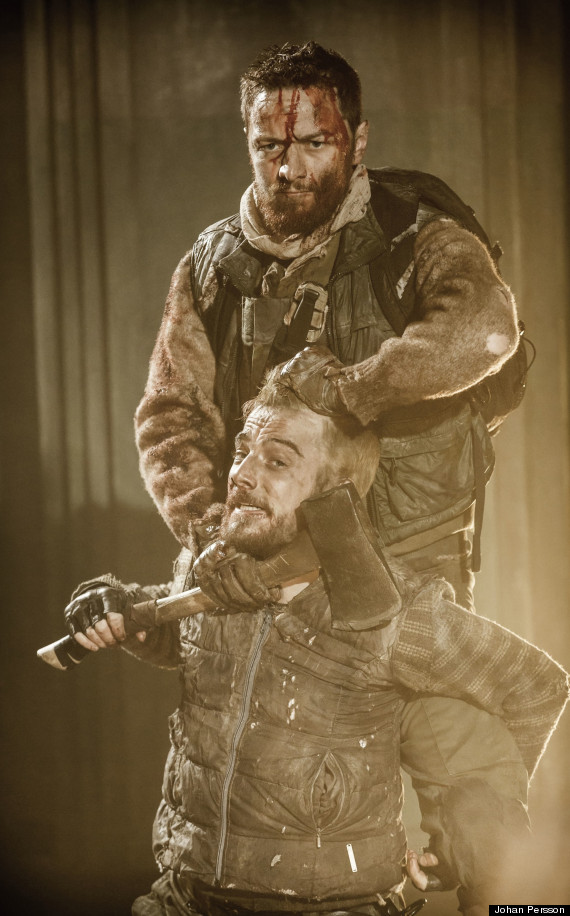 Does it feel like the Scottish play to you? Is it a play about Scotland written by an Englishman from your point of view as a Scottish actor?
Does it feel like the Scottish play to you? Is it a play about Scotland written by an Englishman from your point of view as a Scottish actor?
It’s not got a Scottish voice. It’s not like Synge. It’s not like doing Playboy of the Western World where you get the voice of the west and the voice of the islands of Ireland. It’s not like that. You’re not going a modern version of old Scots. You’re doing English from Albion, as spoken in the south-east of Albion at the time. You’re not in Alba at all. But it is historically set in a place as depicted by Shakespeare as incredibly brutal and incredibly violent, incredibly superstitious, and that is something that I do believe is representative of Scotland in 1044. Do I think this play is about Scotland? No, not at all. As much as Romeo and Juliet is about Italy. The fact that we are doing it as Scottish I don't think is massively relevant. It’s just that I am Scottish and why not? But I don’t really feel it is a play about Scotland or what it is to be Scottish. It’s just a story inspired by history that was designed as a present for James I. What is great about Shakespeare is that he goes, "Right, there’s a new king of England, he’s James I of England and James VI of Scotland and he is taking over. I should write a really nice piece basically saying. 'Isn’t Scotland great? We’re really pleased we’re all part of the same country now.'" But instead he wrote this play that suggests we’re all bloodthirsty fuckers, we’re all obsessively bound in by fears and superstition and believe in magic and witches and that we’ve an ambitious ladder-climbing bloodthirsty king. I think that’s amazing that that was what he gave James VI of Scotland when he ascended the throne in England as a present. And you write something so true and honest and compelling that I think it must have gone down rather well.
Did you contemplate doing it in an English accent?
No no no. That would just be silly. If you’re English and you’re doing Macbeth then fine, do it in an English accent. It doesn’t matter. It’s written for an English accent. Just equally you’re doing Romeo and Juliet, it’s set in Italy but it’s not written for Italians. Why do an Italian accent? I’m not saying that Shakespeare doesn’t concentrate on his consonants but you do need the consonants in Shakespeare in a way that the English accent works really well for. Scottish people extend our vowels a lot more so it’s an interesting marriage between the two in terms of what your accent naturally gives you and what Shakespeare actually need sometimes as well because it’s written for an English voice.
Are you buying into the trappings of superstition? Are you calling it "the Scottish play"?
I am saying Macbeth as many times as I possibly can. I’m not buying into it. I shall not be bound in by saucy fears and doubts as Macbeth is.
Explore topics
Share this article
The future of Arts Journalism
You can stop theartsdesk.com closing!
We urgently need financing to survive. Our fundraising drive has thus far raised £49,000 but we need to reach £100,000 or we will be forced to close. Please contribute here: https://gofund.me/c3f6033d
And if you can forward this information to anyone who might assist, we’d be grateful.

Subscribe to theartsdesk.com
Thank you for continuing to read our work on theartsdesk.com. For unlimited access to every article in its entirety, including our archive of more than 15,000 pieces, we're asking for £5 per month or £40 per year. We feel it's a very good deal, and hope you do too.
To take a subscription now simply click here.
And if you're looking for that extra gift for a friend or family member, why not treat them to a theartsdesk.com gift subscription?
more Theatre
 The Billionaire Inside Your Head, Hampstead Theatre review - a map of a man with OCD
Will Lord's promising debut burdens a fine cast with too much dialogue
The Billionaire Inside Your Head, Hampstead Theatre review - a map of a man with OCD
Will Lord's promising debut burdens a fine cast with too much dialogue
 50 First Dates: The Musical, The Other Palace review - romcom turned musical
Date movie about repeating dates inspires date musical
50 First Dates: The Musical, The Other Palace review - romcom turned musical
Date movie about repeating dates inspires date musical
 Bacchae, National Theatre review - cheeky, uneven version of Euripides' tragedy
Indhu Rubasingham's tenure gets off to a bold, comic start
Bacchae, National Theatre review - cheeky, uneven version of Euripides' tragedy
Indhu Rubasingham's tenure gets off to a bold, comic start
 The Harder They Come, Stratford East review - still packs a punch, half a century on
Natey Jones and Madeline Charlemagne lead a perfectly realised adaptation of the seminal movie
The Harder They Come, Stratford East review - still packs a punch, half a century on
Natey Jones and Madeline Charlemagne lead a perfectly realised adaptation of the seminal movie
 The Weir, Harold Pinter Theatre review - evasive fantasy, bleak truth and possible community
Three outstanding performances in Conor McPherson’s atmospheric five-hander
The Weir, Harold Pinter Theatre review - evasive fantasy, bleak truth and possible community
Three outstanding performances in Conor McPherson’s atmospheric five-hander
 Dracula, Lyric Hammersmith review - hit-and-miss recasting of the familiar story as feminist diatribe
Morgan Lloyd Malcolm's version puts Mina Harkness centre-stage
Dracula, Lyric Hammersmith review - hit-and-miss recasting of the familiar story as feminist diatribe
Morgan Lloyd Malcolm's version puts Mina Harkness centre-stage
 Reunion, Kiln Theatre review - a stormy night in every sense
Beautifully acted, but desperately grim drama
Reunion, Kiln Theatre review - a stormy night in every sense
Beautifully acted, but desperately grim drama
 The Code, Southwark Playhouse Elephant review - superbly cast, resonant play about the price of fame in Hollywood
Tracie Bennett is outstanding as a ribald, riotous Tallulah Bankhead
The Code, Southwark Playhouse Elephant review - superbly cast, resonant play about the price of fame in Hollywood
Tracie Bennett is outstanding as a ribald, riotous Tallulah Bankhead
 The Lady from the Sea, Bridge Theatre review - flashes of brilliance
Simon Stone refashions Ibsen in his own high-octane image
The Lady from the Sea, Bridge Theatre review - flashes of brilliance
Simon Stone refashions Ibsen in his own high-octane image
 Romans: A Novel, Almeida Theatre review - a uniquely extraordinary work
Alice Birch’s wildly epic family drama is both mind-blowing and exasperating
Romans: A Novel, Almeida Theatre review - a uniquely extraordinary work
Alice Birch’s wildly epic family drama is both mind-blowing and exasperating

Add comment